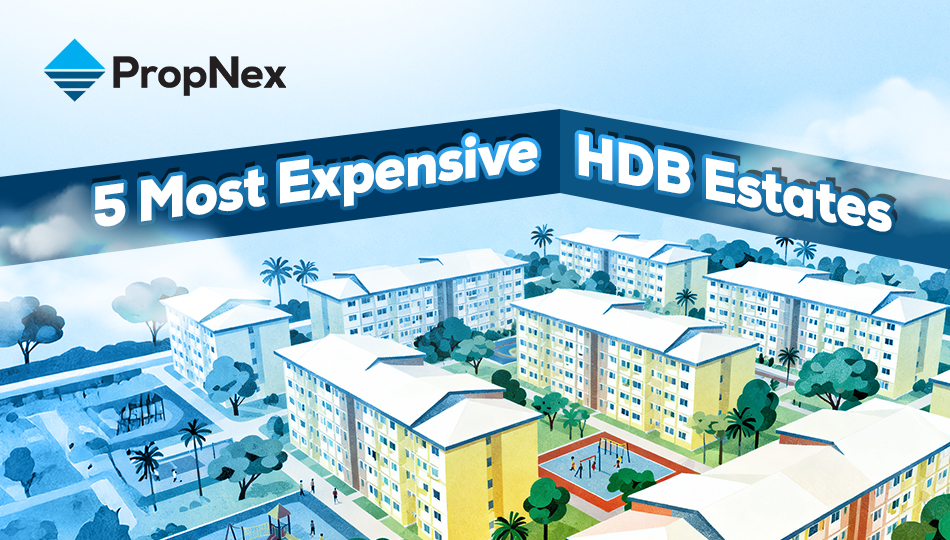Do Not Play The Waiting Game Because Home Prices Are Unlikely to Drop in 2023
By Wong Siew Ying, with comments from Kelvin Fong
Many had predicted mid-way into the year that the cooling measures would come, but the question was exactly when will they hit and in what form.
Nine months since the introduction of a package of property cooling measures in December 2021, the Singapore government intervened again in September 2022 - with new curbs to ensure homebuyers do not overstretched their finances to buy a property as interest rates spike.
Indeed, the unrelenting rise in interest rates through 2022 has been a big talking point. It begs asking: will a higher financing cost choke property demand, thereby causing prices to slide? PropNex Picks posed this burning question to Executive Director Kelvin Fong. Read on to find out what buyers can do to navigate the property market in 2023.
KELVIN FONG, EXECUTIVE DIRECTOR, PropNex
1. What has been the biggest property market highlight of 2022 for you, and why?
KELVIN: The pace of interest rate hikes was something that stood out in 2022. To contain rampant inflation, central banks around the world raised rates aggressively, led by the US Federal Reserve. This has had an impact on interest rates in Singapore. The 3-Month SORA (Singapore Overnight Rate Average) that is used to priced home loans shot up from 0.195% p.a. on 4 January to 3.095% p.a. on 13 December. We also saw banks revised upwards their fixed home loan rates a couple of times as interest rates continued to rise.
For many home buyers and home owners, this can be daunting – some of them, particularly younger ones may not have experienced such a high interest rate before. The cost of a home loan has generally been low since the global financial crisis. Suddenly, they are looking at fixed home loan package rates of over 4% when for years, they have enjoyed low rates of below 2%. What happens then? People are worried, they are uncomfortable and are not sure if they should buy their first property, or upgrade or even invest in a second property.
The rising interest rate environment also prompted the government to implement new cooling measures at the end of September 2022, aimed at encouraging home buyers to be more prudent with their property purchase.
I think what we are seeing is a normalisation of interest rates, following over a decade of super low rates. I believe most of the outsized, aggressive rate hikes have been done this year by the Fed. There is a possibility the Fed will put the brakes on jumbo hikes going into 2023 – translating to a slower increase in home loan rates, which may stabilise in the second half of 2023.
Some people may be put off by the high interest rates and decide to wait; they are perhaps also wondering if prices will drop (which I will address in the next question). The point I want to make is that it is not possible to time the market perfectly. If you see a property that you love and that it fits your budget and needs, you can still buy, or upgrade, or invest even when interest rate is high – the key lies in proper financial analysis, which all PropNex agents can assist with. If you are in the market for a property, I encourage you to speak to our agents. They are equipped with a variety of PropNex proprietary digital tools to help you make sound decisions, from assessing your financial strength, to capital appreciation potential of a property, as well as whether the property is suitable for you.
2. There are some views that the housing market may slow and prices may fall in 2023 due to a recession or due to the high interest rates affecting demand. What is your take on this?
KELVIN: The short answer is, I don’t expect home prices to correct downwards in 2023. Why is this so? There are several pillars that will hold up prices and I will highlight them in turn.
In the new sale market, we all know that selling price is a function of land price and construction cost. In recent years, construction cost is estimated to have risen by some 30% and land price of Government Land Sales sites remained firm. This leaves very little room for developers to cut prices. In addition, there is a limited stock of unsold new homes in the market – just over 15,000 units (ex. ECs) in the pipeline with planning approvals as at Q3 2022. This stock can be sold in 2 years if we take a conservative annual sales forecast of 7,500 units. The supply imbalance is particularly acute in the OCR, based on our observations. With tight supply and still healthy demand, developers do not see the need to reduce prices.
In the resale market, there’s feedback that the number of homes available for resale is limited. Not enough supply. Owners are reluctant to sell for several reasons: 1) rental market is booming, they rather rent it out for recurring income; 2) high replacement cost discouraging some owners to sell and buy another property; and 3) government policy- related factors. The additional buyer’s stamp duty (ABSD) on second and subsequent home purchase has deterred owners of multiple properties from selling their investment property – if they want to buy another home in the future they will have to pay hefty ABSD. The new 15-month wait-out period introduced as part of the cooling measures in September may also lead to some private home owners to hold back on their plans to sell and downgrade to an HDB resale flat. These factors will weigh on resale supply. Again, low supply against steady demand – will prices drop?
While global headwinds and economic downturn can potentially affect buying sentiment, we think there are genuine buyers – through new family formation, first-timer buyers, new citizens, HDB upgraders, foreign investors – who will prop up housing demand. The job market is still tight, and many Singapore households still have strong purchasing power. In addition, the Singapore property market is stable with a low level of speculative activity. So, my take is this: home prices are not going to fall, but we may see a slower pace of increase in 2023.
3. What are some potential investment opportunities/bright spots to look out for in 2023?
KELVIN: A lot depends on the individual’s needs and budget but generally, I would say those with a tighter housing budget may want to look at the resale condo market. In the past year, resale prices have risen at a slower clip compared to new launch prices. Based on caveats lodged, the non-landed average unit price of new launches jumped by 23% from 2021 to Q4 2022 (up till 4 December), while that of resale properties only rose by 8% over the same period (see Chart 1).
This has opened up a large price gap between new sale and resale transactions. Looking at Chart 1, the average price gap between non-landed resale properties and new launches is a staggering $1,074 psf in Q4. The average transacted price for new launch being $2,655 psf and resale average price at $1,581 psf in Q4 2022. This latest price gap is a big jump from that of $689 psf in 2021. We expect resale prices could continue to climb gradually in 2023 but will not outpace new launches.
Of course, there are considerations when it comes to buying resale properties. One needs to know that resale prices tend to rise more slowly or even stagnate after a while. This is because the valuation of resale properties is usually tied to recent transactions in the area, it is unlikely that a resale unit can fetch way above the market rate. In any case, an overpriced resale unit will be hard to sell because buyers will go for other units within the same project or around the area that are more reasonably priced. There is also the issue of maintenance cost and declining lease balance to think about, if one is looking to buy older 99-year leasehold properties.
Chart 1: Average unit price (S$ PSF) of non-landed private homes (Resale vs New Sale)
%20Chart.jpg)
Source: PropNex Research, URA Realis (up till 4 Dec 2022)
In 2023, we are expecting more new condo projects to be launched. They will provide a greater selection of units for home buyers who may perhaps find their options quite limited in today’s market due to the dwindling unsold stock. Although we expect developers to remain sensitive in their pricing strategy due to the recent cooling measures and global headwinds, we do think prices will maintain on a slight uptrend in 2023.
It is likely that home prices in the Rest of Central Region (RCR) and Core Central Region (CCR) could rise more than that of Outside Central Region (OCR). The price upside in the RCR will be supported by several projects that fetched land prices of more than $1,300 psf ppr (e.g. Dunman Road, Jalan Tembusu, and Pine Grove), while CCR prices will be propped up by fresh launches from redevelopment projects in the city, including the former Maxwell House, AXA Tower, Fuji Xerox Towers, and the Marina View GLS site.
New launches will remain sought after by buyers despite their firm pricing. There are several reasons why some buyers are willing to pay a premium for new launches. Firstly, they will be getting a brand-new property, with modern facilities and a fresh lease, if we are talking about 99-year leasehold developments. Another reason is the potential for capital growth due to the first-mover advantage. Generally, a developer will price units most attractively at the start of the launch, once the sales hit a certain level, the developer may start to raise prices – so, there is a good chance that someone who bought a unit during the launch weekend could already be sitting on paper gain while the project is still being sold.
There will be buying opportunities next year regardless of the individual’s budget – if it is not in the private property market, then in the HDB resale segment. Our agents will be able to highlight some options and provide detailed analysis. Buyers today are sophisticated, if you want to know more about property investment and financial planning, I highly encourage you to attend our Property Wealth System (PWS) masterclass.
4. What do you think are the key risks in the residential property segment that buyers and investors should be aware of in 2023?
KELVIN: The challenges next year are issues we have heard about – possibility of a global recession, geopolitical tension/conflict, high inflation etc. The risks that are implied in all that include job insecurity or job losses, higher cost of living, and weak market sentiment. For home buyers and owners, it boils down to financial holding power. Should there be a recession, do you have the financial means to tide through the rough times?
Buying a property is a long-term commitment, a home loan tenure can stretch for 20 years or longer. Therefore, it is crucial for buyers to go in with their eyes open and be as thorough as possible about their financial assessment and life goals. What can you comfortably afford to buy now? What are your expenses and future plans – are you looking to have more kids, do you intend to take a sabbatical to further your studies, do you plan to buy a car at some point, or perhaps you want to set up your own business? How much should you set aside as backup funds to deal with unforeseen events (such as a sharp interest rate hike, retrenchment or a family emergency)? Are you planning to upgrade to another property after a number of years? What are the resale prospects for a particular property that you are hoping to buy?
I know it is long list of questions and there are probably more considerations I have not cited. The bottom line is that the more detailed you are at the planning stage, the greater peace of mind you can have pertaining to the property purchase – because you know you have the financial means to weather the market downcycle when they do happen. PropNex agents have all been trained to help clients assess their financial circumstances and navigate the property investment journey (see Question 5 too). Do reach out to them for a consultation.
5. You have been a firm believer in data analytics and proptech, tell us what we can expect on this front from PropNex in 2023?
KELVIN: It is clear that technology helps to drive business transformation, increase productivity and create value for our clients. PropNex, as the industry leader has over the years been innovating and rolling out new digital tools to help our clients stay up-to-date with the market and get the best deals.
Our 12,000 PropNex agents serving the Singapore market are equipped with various digital tools to help clients determine their risk exposure and financial position, giving them a greater peace of mind to transact. Our tech solutions also provide greater convenience as our agents can provide clients with a whole list of project information that they need, compare floor plans and help them shortlist options efficiently.
For example, the PropNex Sales Suites App that allows agents to manage listings across portals, fix appointments, locate project taggers, and close deals in a speedy and efficient manner. We have also launched the Risk Analysis Method (RAM) platform which has been an extremely handy tool for both PropNex agents and their clients.
Using the RAM financial assessment tool, our agents can work with their clients to plan ahead, help them evaluate their financial position and risk tolerance, set buffer funds and review their portfolio. It is a detailed risk analysis, and a customised report will be generated for each client. Why is this important? In any investment, there are risks and when you fail to plan properly, you expose yourself to uncertainties and increase your risk exposure. When clients work with PropNex agents, the RAM tool will give them a measure of certainty and security, knowing that they have considered all aspects of their financial commitment towards the property purchase – they are making an informed decision, one that is backed by sound risk analysis.
In 2022, we introduced our PropNex Investment Suite. This is a dynamic mobile app that provides all the relevant real estate transaction data and trends that our agents can access on the go, wherever they are. Though the app, clients will be able to find out the transaction history for any given residential property in Singapore, plot the transacted price trend over a period of time, filter transaction data by number of bedrooms, which is a unique feature of the app. Clients will also be able to analyse the data by “stack view” which shows the sales trend for units within a certain stack of a condo project. If they wish to know the amenities and schools around a certain property, or the prevailing SORA rate etc, such information can all be found in the app. It is a digital tool that really adds value to our clients.
As the largest real estate agency in Singapore with 12,000 agents (at the time of writing) and about 50% share of the market, PropNex has the critical mass and is well-poised to evaluate market statistics and provide insights to support our salespeople and help our clients. As we continue to enlarge our agency footprint, we will be able to capture even more transaction data which will help us to better understand the evolving needs of buyers and sellers. So, when someone appoints a PropNex agent, that individual is not only working with a well-trained and professional salesperson but also one who is support by solid digital tech arsenal.
On the consumer outreach front, we continue to host in-person seminars, property expo, PWS masterclasses, and online webinars just to name a few. We hope these initiatives can help Singaporeans understand the property market, review their needs and get started on their investment journey so as to build capital and enhance retirement adequacy.
Sign up to PropNex Friends today for timely insights, fresh real estate content and exclusive deals.

免责声明:
尽管已采取一切合理措施确保此处打印或呈现的信息是准确的,但对于因任何错误或遗漏而造成的任何损失或不便,我们概不负责。此处提供的想法、建议、一般原则、示例和其他信息出于教育目且仅供参考。
此处包含的信息无意以任何方式提供针对购买、出售或出租房地产,或是任何形式的房地产投资的相关投资、监管或法律意见和建议。 博纳对于读者做出的任何相关决定,以及从中产生的任何损失或费用概不负责。
保留所有版权。












